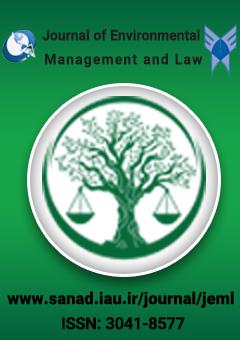Identifying internal and external factors affecting environmental behavior of students based on content analysis
Subject Areas : Promoting and improving the culture of environmental protection
Nasrolah Ghashghaeizadeh
1
*
,
Marzieh Firouzi
2
![]()
1 - Department of Educational Management, Faculty of Educational Science & Psychology, Isfahan (Khorasgan) Branch, Islamic Azad University, Isfahan, Iran
2 - MSc in Educational Management, Faculty of Human sience, Shahreza Branch, Islamic Azad University, Shahreza, Iran
Keywords: Environmental behavior, students, thematic analysis, factors inside and outside the school,
Abstract :
The purpose of this research was to identify the factors inside and outside the school that affect the environmental behavior of students based on thematic analysis. This research was conducted with a qualitative approach and a theme analysis type using Atride-Sterling method. The participants in this research included experts who were aware of the research problem, who were selected by the purposeful snowball sampling method, and the sampling continued until theoretical saturation was reached. The research participants included 11 experienced and expert people in the fields of education, environment and health. In the present study, semi-structured interviews were used to collect information. In order to trust the data, the four criteria of transferability, validity, dependence and confirmation were used. Based on the findings, there are 15 organizing themes of culture building, strengthening the emotional relationship between students and the environment, wise management of the environment, morals and environmental literacy of parents, motivational plans of responsible institutions, institutionalizing respect for the environment, role models of those in charge, using educational opportunities. , interaction with the environment, dynamic education about the environment, environmental assistants in schools, hidden curriculum, curriculum content, attention to upstream policies and documents, and environmental ethics, finally, 2 overarching themes of internal and external factors have been extracted.
Abdollahi, A. S., & Sadeghi, H. (2024). Environmental Attitude, Knowledge, and Energy Consumption Behavior (Case Study: Citizens of Isfahan). Environmental Education and Sustainable Development, 12(3), 29-42.
Afzal Khani, M. (2020). The Effect of Environmental Education on Students' Attitude and Behavior toward Environmental Protection in Garmsar. Geography (Regional Planning), 9(37), 57-78.
Arjamandi, R. (2000). Environmental strategy of sustainable agriculture, doctoral dissertation in the field of environment. Islamic Azad University, Research Sciences Branch, Tehran.
Asadi, M., Naghizadeh, M.M., Mazloumi, S., & Ghazanfari, Z. (2017). Investigating the knowledge, attitude and environmentally responsible behaviors of female students of first secondary schools. Paish, 17(6), 677-686.
Ataei Asad, M., & movahdi, R. (2022). Investigation of Pro- Environmental Behavior of Girl’s students (Case Study of Senior Secondary Schools in Hamadan city). Human and Environment. (4)20: 87-102.
Baboli, M. (1985). Environmental education from elementary school to university, unpublished research, Tehran, Environmental Protection Organization, Iran.
EPA's Department of Public instruction and Participation. (2008). ComprehensiveEnvironmental Education Plan for Environments. EPA: Tehran.
Glaser, B., A. Strauss. (1967). The Discovery of Grounded Theory: Strategies for Qualitative Research, Chicago, IL: Aldine.
Hess-Quimbita, G., & Pavel, M. (1996). Assessing an Environmental Attitude Development Model: Factors Influencing the Environmental Attitudes of College Students.
Hoffman, J., & Gross, E. (2016). Study of the importance of teaching environmental components in schools. Journal of Authentic Learning in the context of Landscapes, 75(15): 235-257.
Ismailnejad, M., Eskandari Thani, M., & Rezaei, A. (2021). An analysis of the culture and responsible environmental behaviors of the citizens of Birjandi. Man and Environment, 19(1), 161-173.
Kaviani, e., Naseri Pelengard, V., Chobkar, n., & Kalhari, m. (2022). Developing a strategic plan for health, safety and environmental management of schools in Kermanshah province. Man and Environment, 20(4), 197-215.
Khalegizadeh, Firuzeh. (2012). Studying the existing methods of environmental education to preschool and primary school children from the perspective of educators. [Master's thesis, Faculty of Humanities, Payam Noor University]. South Tehran Branch.
Kostova, Z., & Atasoy, E. (2008). Methods of Successful Learning in Environmental Education. Online Submission, 4(1), 49-78.
Mirzaei, H., Sharifzadeh, H., & Sohrabi, M. (2021). Investigating Factors Affecting Environmental Behaviors in Iran (Meta-analysis of existing research). Journal of Economic & Developmental Sociology, 10(2), 183-203.
Rajaiean, N., Keshtiaray, N., Nad, M.A. (2019). Design of Educational Course for water Consumption based on Flipped Learning (A qualitative research). Teaching in Research of J, 6(4), 166-188.
Rakotomamonjy, S. N., Jones, J. P. G., Razafimanahaka, J. H., Ramamonjisoa, B., & Williams, S. J. (2015). The effects of environmental education on children's and parents' knowledge and attitudes towards lemurs in rural M adagascar. Animal Conservation, 18(2), 157-166.
Sauvé, L. (2005). Currents in environmental education: Mapping a complex and evolving pedagogical field. Canadian Journal of Environmental Education (CJEE), 11-37.
Sharfi, M., Mahmoudi, S., & Hossein Bar, B. (2021). Investigating the impact of exploratory education in nature school on the environmental knowledge, attitude and behavior of primary school students. Bimonthly scientific-research journal of new approach in educational management, 12(1), 15-27.
Shobeiri, S. M., Meiboudi, H., Maleki pour, A., & Saradipour, A. (2014). Assessment and Preparedness of Preschool Educators for Environmental training to Kids (Case Study: Tehran, Iran). Social Cognition, 3(1), 114-124.
Soltani, K. B. (1992). The collection of topics and methods of environmental urban planning. (1 vol). Iranian Urban Planning and Architecture Research Center, Shahidi Publications.
Soltani, M. (2000). Healthy city, environmentally friendly city. Tehran, Environmental Scientific Quarterly, 33.
Zohoorparvandeh, V., & Hajizadeh, A. (2022). The Impact of Acquiring Cultural Capital Training on Environmental Behaviors Students. Human and Environment, 20(2): 51-69.

